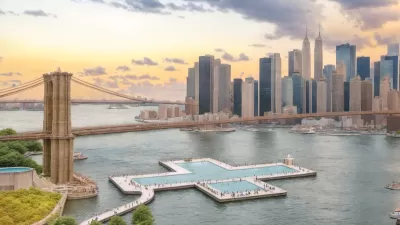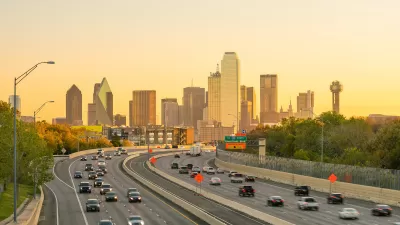Urbanism media noted the growing privatization of recreation facilities, such as pools, as one of the lessons to be taken from a controversial encounter between police and black teenagers in McKinney, Texas over the weekend.
Coverage of a disturbing video that emerged earlier this week noted that racial conflict often emerges at the location of controversial distinctions between public and private.
Yoni Applebaum writes for The Atlantic, drawing insight out of a discussion about the communal pool, located in a private development and off-limits to the public, at the center of the episode that led to the controversy. "The public pools of mid-century—with their sandy beaches, manicured lawns, and well-tended facilities—are vanishingly rare. Those sorts of amenities are now generally found behind closed gates, funded by club fees or homeowners’ dues, and not by tax dollars. And they are open to those who can afford to live in such subdivisions, but not to their neighbors just down the road."
Brentin Mock covers a similar theme for Grist, focusing on the long and often misreported history of Black Americans fighting for access to pools as well as natural settings to swim.
Emily Badger follows Applebaum's theme for The Washington Post, but also makes a connection between the "privately owned public spaces" that made news during the Occupy protests. "This exact same phenomenon has surfaced in many forms well beyond swimming pools. Americans have replaced — or, rather, withdrawn from — many of the public spaces and shared resources that were prominent in communities decades ago. And so private schools take the place of public ones, individually owned cars replace mass transit, secluded yards supplant public parks," writes Badger.
For CityLab, Kriston Capps notes the city of McKinney's central role in a closely watched Supreme Court case, Texas Department of Housing and Community Affairs v. The Inclusive Communities Project, Inc., which is expected to reach a verdict this month. According to Capps, "the Supreme Court case that now concerns McKinney is larger than any single exclusionary amenity. The Roberts court may redefine exclusionary zoning altogether. What the Supreme Court does next will decide whether residents of McKinney—and Flower Mound, and Lewisville, and Sunnyvale, and Frisco, and suburbs and cities far beyond Dallas and Texas—can erect informal barriers to keep poor black residents not just out of their pools, but out of white, wealthy areas in an altogether more profound way."
FULL STORY: McKinney, Texas, and the Racial History of American Swimming Pools

Alabama: Trump Terminates Settlements for Black Communities Harmed By Raw Sewage
Trump deemed the landmark civil rights agreement “illegal DEI and environmental justice policy.”

Study: Maui’s Plan to Convert Vacation Rentals to Long-Term Housing Could Cause Nearly $1 Billion Economic Loss
The plan would reduce visitor accommodation by 25% resulting in 1,900 jobs lost.

Planetizen Federal Action Tracker
A weekly monitor of how Trump’s orders and actions are impacting planners and planning in America.

Wind Energy on the Rise Despite Federal Policy Reversal
The Trump administration is revoking federal support for renewable energy, but demand for new projects continues unabated.

Passengers Flock to Caltrain After Electrification
The new electric trains are running faster and more reliably, leading to strong ridership growth on the Bay Area rail system.

Texas Churches Rally Behind ‘Yes in God’s Back Yard’ Legislation
Religious leaders want the state to reduce zoning regulations to streamline leasing church-owned land to housing developers.
Urban Design for Planners 1: Software Tools
This six-course series explores essential urban design concepts using open source software and equips planners with the tools they need to participate fully in the urban design process.
Planning for Universal Design
Learn the tools for implementing Universal Design in planning regulations.
Caltrans
Smith Gee Studio
Institute for Housing and Urban Development Studies (IHS)
City of Grandview
Harvard GSD Executive Education
Toledo-Lucas County Plan Commissions
Salt Lake City
NYU Wagner Graduate School of Public Service





























